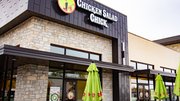Article
Mexican concepts still heating up fast casual
Calexico owner predicts the trend of the 'artisanal chain' is spreading to all sectors in fast casual; Mexican food is no exception.

July 23, 2013 by Cherryh Cansler — Editor, FastCasual.com
After seeing the monstrous success of Chipotle, it's no shock that a plethora of other fast casual Mexican concepts have popped up all over the nation. To some, the market may seem saturated, but Brian Dixon of Costa Vida Fresh Mexican, believes there's plenty of room to grow. In fact, Costa Vida, celebrated the opening of its 50th unit this month and has more than 200 in the pipeline. (Click here to see photos of Costa Vida.)
"I don't think it's saturated at all; there's a lot of room for growth for all players who do well," he said. "And the success of competitors — like Moe's and Qdoba — are just a testament to the appeal of our style of food."
Lucky for Dixon, the growth and success of Mexican fast casual concepts are, in fact, trending up, according to Technomic, which has tracked the segment over the past decade. Although the biggest jump came between 2003 and 2006, when concepts grew by 100 percent, growth is still steady. Between 2009 and 2012, for example, sales went from $4,188,000 to $5,941,000. (Technomic tracked the growth of 17 fast casual chains in 2003 vs 59 in 2013, also a testament to the segment's growth).
Another research firm, NPD Group, found similar results when it studied the sales of 10 fast casual Mexican chains throughout the past five years. Sales at those chains went from $2,802,659 in 2009 to $4,662,505 (so far) in 2013.
 |
| Calexico owners pose with Martha Stewart after they appeared on her show. Left to Right: Peter Oleyer (partner & chef) and Brothers/founders, Brian Vendley, Dave Vendley and Jesse Vendley. |
'A good way to eat'
Mexican food makes sense as a fast casual concept, said Dixon, because people like tasteful food, which they easily find in the category.
"All those spices, jalapenos, salsas — it's not bland. It excites the taste buds," he said.
The other big reason Mexican food is so popular now is that it meets consumer demand for fresh, healthy food that's also easily customized.
"You're eating things that are wholesome — tomatoes, peppers, onions, fresh salsa and lettuce — it's all good for you but filling, too, and it feels good not having something so heavy plopping in the bottom of your stomach," Dixon said. "It's just a good way to eat."
Costa Vida, like many of the fast casual concepts, stresses customization, a trend that customers won't stop demanding soon.
"We have that ability to the nth degree — three kinds of torts, a variety of beans and salsas and dressings," Dixon said. "There are millions of possibilities, and that's all done very quickly as people come in. They can tweak their favorites or get something different each visit. It's not same, old same old menu as if (we served) one thing, one kind of way."
Smaller chains driving ahead
Another fast casual chain that hopes to take a piece of the Chipotle pie is New York City-based Calexico, launched by three brothers as a street cart business in 2006. After three successful years, it opened a brick-and-mortar store in Brooklyn to acclaim. The chain received the Vendy Award in 2008 (for street vendors), was named Zagat's Best Mexican in NYC in 2012, and was also featured on The Martha Stewart Show. (Click here to see photos of Calexico.)
"We had no idea it would take off," said Founder Jesse Vendley. "In fact, we didn't even intend on opening a restaurant at all."
Vendley and his two brothers rented the first store for the kitchen because they were struggling to supply the street carts out of the commissary they were using.
"We found an inexpensive place in an out-of-the-way neighborhood, and it just happened to have a small dining room attached to the kitchen," Vendley said. "We didn't expect it to do much business, but we were happy to find out otherwise. It didn't take long for our little store to outperform our carts. After that, we started focusing more on restaurants."
Part of Calexico's success, Vendley said, is the brothers' focus on creative, unique flavors, but he also shares Dixon's beliefs that Mexican concepts are winning in fast casual because they offer customization and healthy alternatives.
"Mexican food offers big, bold flavors and it can be a lot more varied and healthy that many people realize," Vendley said. "Most American diners have only scratched the surface of what Mexican cuisine can offer, and I attribute some of its surge in popularity to people having fun exploring the cuisine. From a practical standpoint, Mexican food makes sense for fast casual because it's relatively simple to produce. You don't need a culinary degree to make a great taco. It also travels well, which is a big plus when you do a lot of delivery business like we do."
Going forward
With so many new Mexican concepts popping up, it's only a matter of time before the weaker concepts start dying off, said Vendley.
"I definitely anticipate some thinning of herd," said Vendley, who has plans in the works for more company stores in the area surrounding Brooklyn. He also has signed franchise deals in Philadelphia and Long Island and will soon open the chain's largest unit in NYC. "Frankly I'm surprised that some of brands are still in the game considering their product. Going forward, there will be less and less room for mediocrity."
The concepts that differentiate themselves in the market will stay ahead of the game, a fact that Vendley and Dixon both understand well.
"Our food is just fresh; we only have two cans in the restaurants, and they are both milk products that we use in our desserts," said Dixon, who believes that combined with what he describes as a "fun personality" helps to make the brand stand out.
"We have surfing and water videos showing on flatscreen TVs, surfboards hanging from the ceilings, and our employees wear casual T-shirt attire. The imagery we use is people playing on the beach," he said. "The founders were in the Baja peninsula (when they got the idea) and they took that warm and casual and sunlit vibrant vibe and stayed true to that positive idea."
Vendley relies on marketing the chain's unique flavor profiles for differentiation and said concepts that don't offer a high-quality product will soon fail in the new envirnoment that is now fast casual.
"Brands like ours are offering a better product at competitive prices, and unless some of these concepts find a way to up the quality of their food, consumers will use their wallets to vote them off the island," Vendley said. "I think this is a trend that you will see in a lot of fast casual segments in the coming years — the rise of the artisanal chain. It's going to be a sea change in the industry, and we hope to be right in the thick of it."
Read more about growth.
 ChatGPT
ChatGPT Grok
Grok Perplexity
Perplexity Claude
Claude












